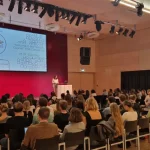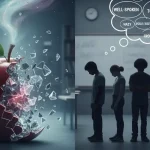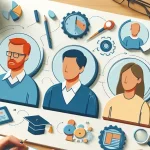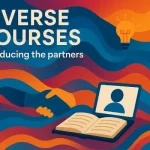On 23rd September 2025, the closing conference of our Erasmus+ cooperation partnership “Diverse Courses” took place at the FH JOANNEUM University of Applied Sciences in Graz, Austria. The coordinating institution was very happy to welcome over 180 guests that could be reached by the conference and the webinars undertaken by the six partner organizations of the project consortium.
Vice-Rector Mag. Martina Koenig of the FH JOANNEUM and Mag. (FH) Dr. Marie-Therese Sagl, Head of the Department of Social Work, welcomed the guests from many different European countries, such as from Italy and Greece, Spain and Portugal, Slovenia and Czech Republic, Latvia and Austria. They underscored the importance of diversity and inclusion in all teaching and learning processes in adult education as well as the success of the consortium in arriving the objectives of its cooperation partnership.
Then keynote speaker Mag. Helga Moser from the Karlsruhe Institute of Technology, Germany, has given her speech on “Diversity and inclusion in adult education”. Helga in fact has been essential to the development of the project in its early phases, since together with the consortium she was active in writing and submitting the application to the Austrian National Agency two years ago. In her speech, Helga presented an overview of different concepts and levels of diversity, such as the well-know diversity wheel, and she has made a distinction between macro-, meso- and micro-levels of diversity.
Following the keynote speech, all of the project partners presented their contributions to the conference. Project coordinator Barbara Hoenig from the FH JOANNEUM introduced the audience to the project consortium’s institution and the project goals as well as the innovative methodology of the personas approach of the consortium. Quality manager Anastasia Giannakopoulo from the Greek organization Dafni Kek developed the original quality management, evaluation and impact approach of the project and presented it to the audience as well as some key project indicators for evaluating the project.
Frasco Hurtado Martinez from the Spanish organization Fundación Docete Omnes introduced the interactive online platform https://toolkit.diversecourses.eu and explained the encompassing accessibility of both the platform and the website. Moreover, he presented one of the most innovative and indeed unforeseen outcomes of the project, the Artificial Intelligence prototype for generating didactical scenarios based on personas developed for the project. Francisca Borges from the Portuguese organization Escola Profissional Amar Terra Verde then outlined the dissemination approach of the project.
Sara Danelon from the Italian organization Cooperativa Cramars then presented the details of the results from Work Package 2, namely the Manual “Diversity Mapping Tools”, the Personas and the Personas step-by-step guide, the Personas Tutorial. Moreover, she has shown an impressive video that has been produced to explain the different components of the respective results, in particular the Personas Tutorial and how it can be used by all interested in using and developing further the personas approach of the consortium. Patricia Pinheiro from the Portuguese Atlantica University then has given a much-appreciated introduction into the results of Work Package 3, in particular the Toolkit of Scenarios produced, which has in fact in three different volumes and also in the videos developed. These will be available on a Youtube channel as well for the broader public. See https://www.youtube.com/channel/UC49RfBpuvSj_kvA6aOXusmg
In the afternoon, the project partners moderated in total five hybrid webinars and one face-to-face-workshop with regional stakeholders, educators and learners such as students in their respective national languages. The results of the project were presented and also used by the participants of the webinars who were actively involved and encouraged to engage with the project tools, methods and scenarios. After two very inspiring and encouraging days working together, all of the project partners were very happy that the final conference turned out to be really a success. Some ideas for a potential follow-up project were also exchanged, which might also be one of the future outcomes of that very strong, amazing cooperation partnership!





